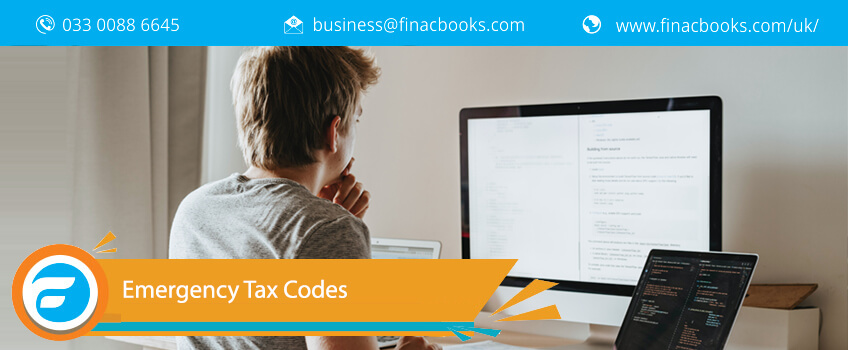What is an Emergency Tax Code?
If you receive an abnormally large pay packet due to bonus’ or share incentives, often people are annoyed when HMRC take an abnormally large amount of tax from that salary. As a precautionary measure, HMRC will tax that month’s salary as though it is your standard monthly wage and take more money than they should. This is known as an emergency tax, which is issued when HMRC holds insufficient information about your income and tax details for the tax year.

In that case, you will be issued a temporary tax code due to the non-availability of the correct tax code. Your employer will use this code to determine how much tax is going to deduct from your wages. These codes are applied as temporary codes to your salary automatically by HMRC.
When will you get an Emergency Tax Code?
Of course, nobody wants to be taxed more than what is necessary, but there are several situations in which you may receive an emergency tax code. You may be put on an emergency code:
- If this is your first job
- If you started a new job after being self-employed
- If you started or stopped getting benefits from your job
- If you receive taxable state benefits
- If you don’t have a P45 statement with you
- If you claim marriage allowances or expenses on which you get tax relief.
How do I know if I’ve been put on an Emergency Code?
There are different ways by which you can find out if you have been placed on an emergency code.
- Check your payslip. You will find an emergency tax code written on your payslip, close to the national insurance number.
- If your tax rate is abnormally high, you could be on an emergency tax code.
HMRC will adjust your payments over the year after gathering information about your income.
Types of Emergency Codes
There are various types of emergency tax codes applied temporarily on employees. Some of them are given below –
1257 emergency tax code - If your tax code begins with 1257, you are entitled to a tax-free allowance of £12,570. If you exceed this amount, you will be required to pay tax. This is correct for the majority of employees, as it is the basic personal allowance and assumes that you are entitled to 1/12th of the allowance each month (1257 M1) (or 1/52th of the allowance each week – 1257 W1 – if you are paid weekly). 1257 X can be used to refer to either of these. Additions of M1 or W1 to your tax codes indicate that you are on a non-cumulative tax code. However, the 1257 tax code discards any backlog of allowances that you may be entitled to — for example, if you were unemployed for several months. As a result, if your tax code is not modified, you may miss out on allowances.
BR Emergency Tax code- A BR code indicates that you do not receive a tax-free personal allowance and hence that everything you earn is taxed at 20% (or the basic rate, as indicated by the letters 'BR'). The addition of a 'W1' and an 'M1' denotes that your tax is not cumulative, either weekly or monthly. The BR code is frequently used when additional sources of income exceeds your tax-free personal allowance. For example, a second job or a pension. For example, a second job or a pension. Employees earning between £12,570 and £50,270 will pay tax at the basic rate of 20%.
OT Emergency Tax Code- OT emergency code is used when your earnings exceed the basic rate band. You will not be entitled to any personal allowance, and you will pay tax according to the basic rate, higher rate & additional tax rate.
- Employees earning between £12,570 & £50,270 will pay tax at the basic rate of 20% on their earnings.
- Employees earning between £50,271 & £150,000 will pay tax at the higher rate of 40% on their earnings.
- Employees earning more than £150,000 will pay tax at the additional rate of 45%.
Why does my tax code end in M1 or W1?
M1 denotes monthly payments & W1 denotes weekly payments. An emergency code ending with M1 OR W1 indicates that your tax is non-cumulative, and your tax will be calculated on a weekly or monthly basis and not annually.
When you are paid weekly, “W1” will be applied at the end of the emergency code, whereas “M1” will be applied at the end when you are paid monthly.
If HMRC does not have sufficient information about your annual income, you may be put on the OT tax code by your employer.
How much is the Emergency tax? Will I be charged?
If you've been given an emergency tax code that excludes the personal allowance, you may be unable to claim tax relief on the first £12,570 of your income. This means that you may end yourself paying more tax than necessary. However, how much more will you pay? In the 2021-22 tax year, basic-rate taxpayers (income up to £50,270) may pay an additional £2,514 in taxes. Higher-rate taxpayers (earning up to £100,000) may pay an additional £5,028 in the financial year 2021-22. Anyone earning more than £100,000 gradually loses £1 of their personal allowance for every £2 earned above that amount. The personal allowance is completely eliminated at £125,000.
How do I correct my Tax Code?
You don't have to worry about being on an emergency code. HMRC should change it, but you have to do certain things to speed up the process –
- Giving your P45 statement to your employer
- If you do not have your P45 statement with you, your employer will ask you to fill a starter checklist.
If your emergency tax code means you’ve paid too much tax, HMRC will send you a tax rebate.
Any Questions? Request a callback from our Tax Experts.


































